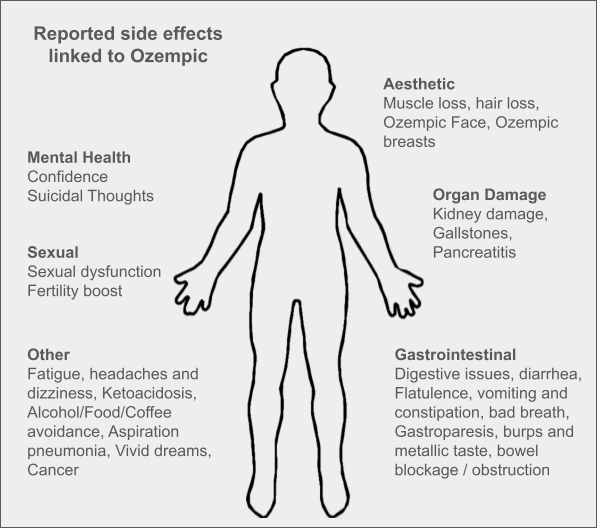Ozempic is touted as a miracle weight loss drug. Ozempic first gained notoriety for its use as weight loss tool in 2021 when the drug was featured on The Dr. Oz Show in a segment titled “Could a Diabetes Drug Cure Obesity?”
What is it? Ozempic is a medication developed to treat symptoms of type 2 diabetes. Today, doctors prescribe off label after discovering weight loss benefits to patients without diabetes. An industry of comparable drugs and service providers have developed around these initial studies to make it easy to use for your medical weight loss journey.
There are many reasons why you might need Ozempic. For your safety, It’s important to talk with your doctor prior to beginning. Obesity is linked to higher rates of type 2 diabetes and various cardiovascular diseases like hypertension, coronary heart disease and stroke. It does not treat these morbidities directly, but it will help you lose weight and decrease the likelihood of developing.
Understanding Ozempic
Ozempic works by creating a pancreatic response to rising blood sugar levels by increasing GLP-1s. Increased GLP-1 hormones will tell your mind you’re full and suppress your appetite. This will prevent overeating. The right foods and exercise will create a caloric deficit for weight loss.
The most common side effects of Ozempic are nausea and constipation. Doctors can prescribe anti nausea medication and fiber supplements as needed to counteract side effects.
Patients must have a BMI of +30 or 26+ with 1+ comorbidities, such as high blood pressure or sleep apnea.
- High BMI: Patients with BMI 30 (obese) or a comorbidity like high blood pressure or sleep apnea and BMI over 26 (overweight)
- Type 2 diabetes
- Uncontrolled A1C
- Cardiovascular disease
- Kidney failure or heart disease
Preparing for Your Doctor’s Appointment
Patients should ensure their doctor is aware of their medical history prior to determining if Ozempic is suitable for them. Patients with type 1 diabetics or persons with a family history of thyroid cancer specifically are not good candidates.
Further, excessive weight gain creates difficulties with sleep, achey joints & muscles, acid reflux, reproductive difficulties, or depression & anxiety. If you are experiencing these, a safe medical solution for weight loss may benefit you.
How to Talk to Your Doctor About Ozempic
Generally you can start by sharing your interest in pursuing weight loss and that you want to consider whether Ozempic will work for you. Your doctor will consider your health metrics and health history to make an initial recommendation. There are preexisting conditions that will prohibit you from taking Ozempic.
Overcoming Doctor’s Hesitations
Commons reasons your doctor won’t prescribe Ozempic can be found on the manufacturer labeling. Further, Ozempic might not be safe for you if you have pancreatitis or gallbladder disease. Diabetic retinopathy or kidney problems are other common interfering conditions.
Your doctor may determine you do not have enough weight to lose for it to make sense for you. Your targeted weight loss is not enough for Ozempic to make sense. Its expensive and unassisted programs with behavioral changes may be more successful for your lifelong success.
What to Do If Your Doctor Won’t Prescribe Ozempic
It is important you consider and research their recommendation. If you feel it is not correct or you have additional information to provide, it is not uncommon to seek a second opinion.
Another opinion can come from a local clinic or online telehealth provider. Doctors follow the same prescribing guidelines, but another doctor may have a different opinion. There may also be similar medications your doctor recommends that you may qualify.
Ozempic will accelerate the pace at which you lose weight, but lifestyle changes are necessary for even those receiving medication if they hope to maintain the weight loss after stopping the medication.
Follow-Up and Monitoring with Ozempic
Beginning Ozempic without an in-person medical exam is not safe. Further, ongoing, routine checkups with blood work helps keep you safe. In addition to helping you identify and address side effects, it’s particularly important to check for thyroid issues, pancreatitis and underlying diabetes.
You and your doctor will set goals for your treatment including targeted weight loss. Tracking your progress and recording your results will help your doctor. It will be important to report issues and successes to your doctor for a customized treatment plan. Consider the below reported sides effects and share with your doctor if you have concerns with the possibility or notice symptoms like the below.
Finally, if you believe you are a candidate for medical weight loss after reading this guide, consult your doctor or local clinic for the expert opinion. Ozempic will aid your weight loss journey, but it’s just a tool to empower you. You’ll stop taking it eventually and lasting behavioral change will be important to maintaining the weight loss or continuing to lose weight.

